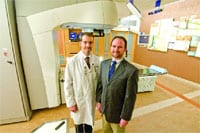New Radiation Therapy to Treat Lung and Other Cancers Now Available at Baystate
SPRINGFIELD — A new technology called stereotactic body radiation therapy (SBRT), which was the subject of a study published in the Journal of the American Medical Association (JAMA) in March, has been introduced at Baystate Medical Center, where radiation oncologists from the Baystate Regional Cancer Program are already offering this treatment for patients with inoperable lung and spinal cancer and a variety of other diseases.
SBRT allows expert radiation oncologists specialized in the technique to safely deliver precisely targeted high doses of radiation through multiple beam angles to a tumor, while at the same time minimizing radiation to adjacent normal tissue.
The precise targeting allows treatment of small or moderate-sized tumors in only a few treatments and can be used for many other medically inoperable conditions that previously have had no effective treatment options, noted Dr. Michael Yunes, director of the Stereotactic Radiosurgery Program, Baystate Regional Cancer Program. He added that, until the advent of the new therapy, patients with inoperable early-stage lung cancer were generally offered conventional radiation treatment over the course of some 20 to 40 outpatient visits.
“Stereotactic body radiation therapy offers new hope for lung-cancer patients with inoperable early-stage lung cancer, many of whom die within two years or less from the cancer metastasizing to other parts of the body,” said Dr. Gary Hochheiser, chief of Thoracic Surgery at Baystate Medical Center.
“This new, convenient option for patients provides excellent local control of the tumor, while also reducing the side effects from radiation treatment,” Yunes added.
The Radiation Therapy Oncology Group study (RTOG) published in JAMA showed that almost 56{06cf2b9696b159f874511d23dbc893eb1ac83014175ed30550cfff22781411e5} of patients who underwent stereotactic body radiation therapy were still alive three years after their treatment. In fact, researchers said the rate of tumor control achieved with SBRT is more than double that found with conventional radiation treatment for inoperable lung cancer. RTOG is a National Cancer Institute-funded national clinical-trials group administered by the American College of Radiology.
The Baystate Regional Cancer Program’s reputation as the most advanced cancer care facility in Western Mass. is supported by the widest range of radiation oncology services available. The use of state-of-the-art technology by radiation oncologists at the D’Amour Center for Cancer Care on the Baystate Medical Center campus in Springfield provides patients access to advanced CT simulation and linear accelerators that enable superior tumor localization and reduce damage to surrounding healthy tissue during radiation. High-dose rate brachytherapy, stereotactic radiosurgery, prostate seed implants, and image-guided radiation therapy round out the program’s comprehensive radiation-oncology services.
Patients also benefit from the unique multidisciplinary care provided by the Thoracic Oncology Program. Also, the Baystate Regional Cancer Program offers a comprehensive array of multidisciplinary programs in a variety of cancer types, including thoracic, breast, gastrointestinal, central nervous system, pediatric oncology, and skin cancer.
“The multidisciplinary approach is the new standard for evaluation and treatment of patients with cancer,” said Hochheiser. “Patients receive state-of-the-art cancer care right here in the Pioneer Valley.”
For more information on the Baystate Regional Cancer Program, call Baystate Health Link at (800) 377-4325 or visit www.baystatehealth.org/cancer.


